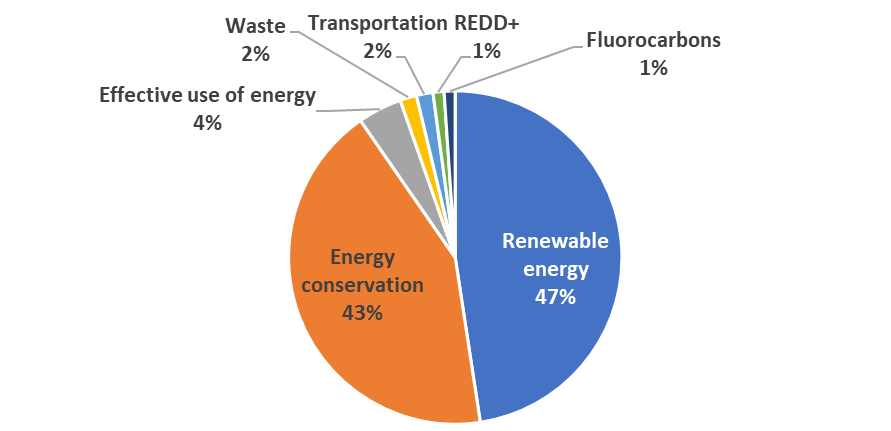On June 15, 2021, the Ministry of the Environment of Japan (MOE) formulated the “Decarbonization Infrastructure Initiative” to further promote the overseas expansion of environmental infrastructure through the Joint Credit Mechanism (JCM). The initiative clearly identifies four actions necessary for JCM expansion, and also identifies three areas to focus on: renewable energy, green logistics, and waste management infrastructure.
The original text of the announced initiative can be viewed below.
https://www.env.go.jp/press/files/jp/116383.pdf
Four actions to create better opportunities for JCM expansion
The initiative has set a target of 100 million tons of cumulative GHG emission reductions from JCM projects by FY2030 through public-private collaboration, which is equivalent to a maximum project size of about 1 trillion yen. In order to accelerate JCM more than ever to achieve this goal, the following four actions are specified in this initiative.
- Leading the creation of international rules on market mechanisms
-
- Leading the discussion about the rules of Article 6 of the Paris Agreement (market mechanism)
- Making JCM a de facto standard globally and develop its market
- Diversification of funds including private funds
-
- Cooperation with public funds (co-financing with Japan Bank for International Cooperation, Japan Overseas Investment Corporation for Transport and Urban Development, etc.)
- Cooperation with international organizations (formation of JCM projects with the Asian Development Bank (ADB), use of World Bank funds, etc.)
- Improvement of the environment for JCM projects, mainly using private funds
- International and regional cooperation, including cooperation with the U.S. and Australia
-
- Expansion of target regions in the Indo-Pacific region
- Introduction of advanced technologies through collaboration with third countries such as the U.S. and Australia
- Utilization of JCM in the Carbon Offsetting and Reduction Scheme for International Aviation Scheme (CORSIA)
- Development of a decarbonized market through integrated support from the formulation of long-term strategies to the implementation of measures
-
- Promote the transition to a decarbonized and sustainable society, from the formulation of long-term strategies to the implementation of measures
- Propagation of Japan’s zero-carbon cities, environmental policies, and standards to overseas markets
- Utilize the platform for overseas deployment of environmental infrastructure
Three focus areas for JCM
In the latest initiatives, the following three categories were identified as focus areas for JCM:
- Renewable energy
Solar, wind, hydropower, geothermal, biomass, green hydrogen, etc. - Green logistics
CFC-free cooling system, modal shift, airports and harbors, etc. - Waste management infrastructure
Waste power generation, recycling facilities, final disposal sites, etc.
In addition to the above, energy-saving facilities, effective use of energy, CCUS, CFC recovery and destruction, septic tanks, REDD+, etc. are also mentioned in the initiatives.
The following figure shows the results of JCM by Japan to date in each field:

Fig. Actual achievement of JCM projects by Japan (as of February 2021)
Background to the development of the decarbonization infrastructure initiative
According to the MOE, the initiative aims at developing decarbonization technologies and capturing markets where these technologies can be applied. The decarbonization market is expanding globally, and is said to be the largest investment area, and is also in line with Japan’s goal of green growth.
In addition, in order to achieve the Japanese government’s pledge to become carbon neutral by 2050, the use of JCM is indispensable. JCM is a system to reduce greenhouse gas emissions in developing countries by promoting low-carbon technologies, products, systems, services, and infrastructures in those countries, and to utilize those reductions as credits. This system is important for private companies aiming to become carbon neutral. In addition, JCM is expected to be more active than ever when the rules of Article 6 of the Paris Agreement are agreed upon at COP26, which is scheduled to be held in November 2021, and further progress is expected.
 MOE of Japan formulates decarbonization infrastructure initiative
MOE of Japan formulates decarbonization infrastructure initiative 

























